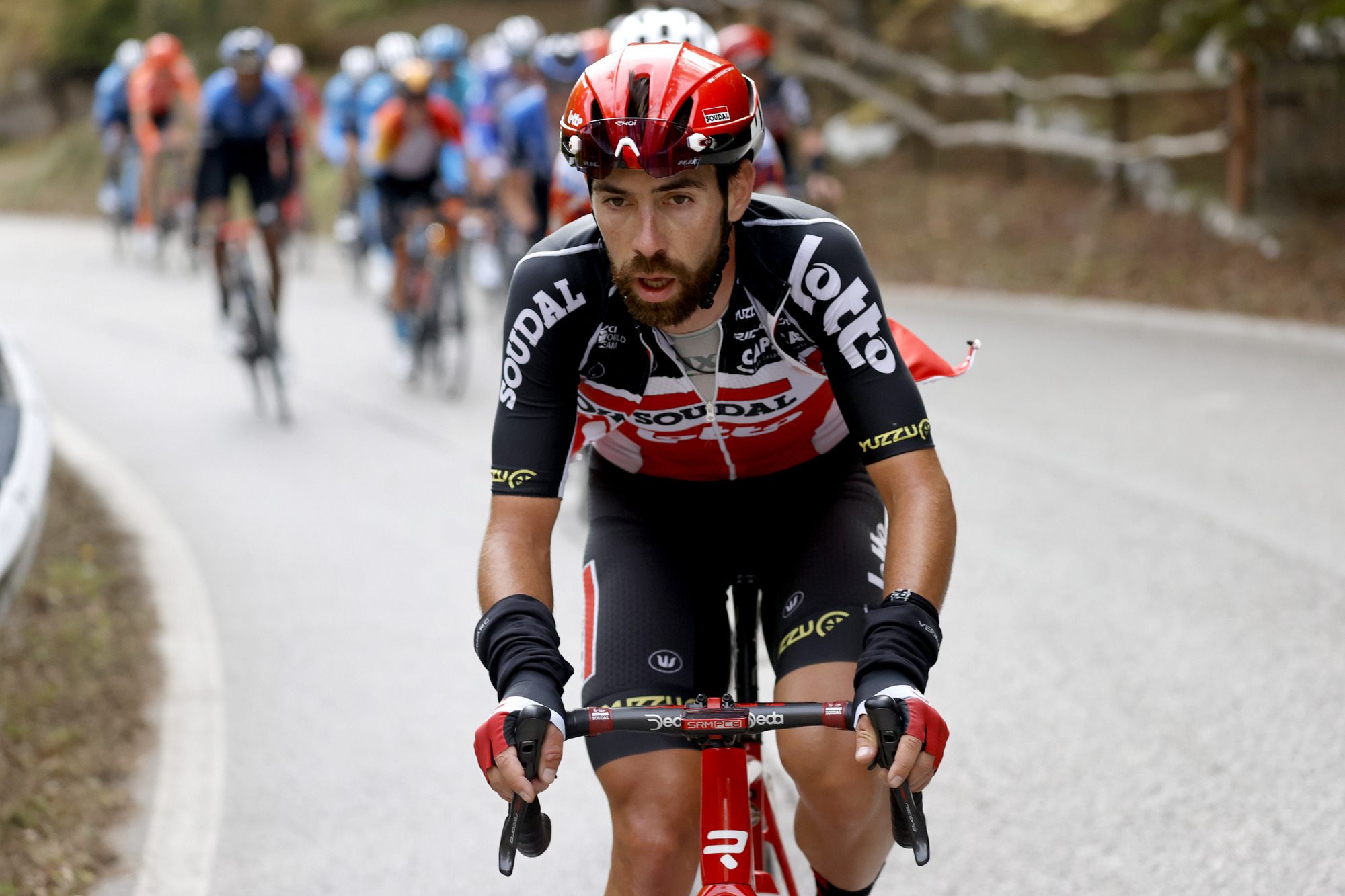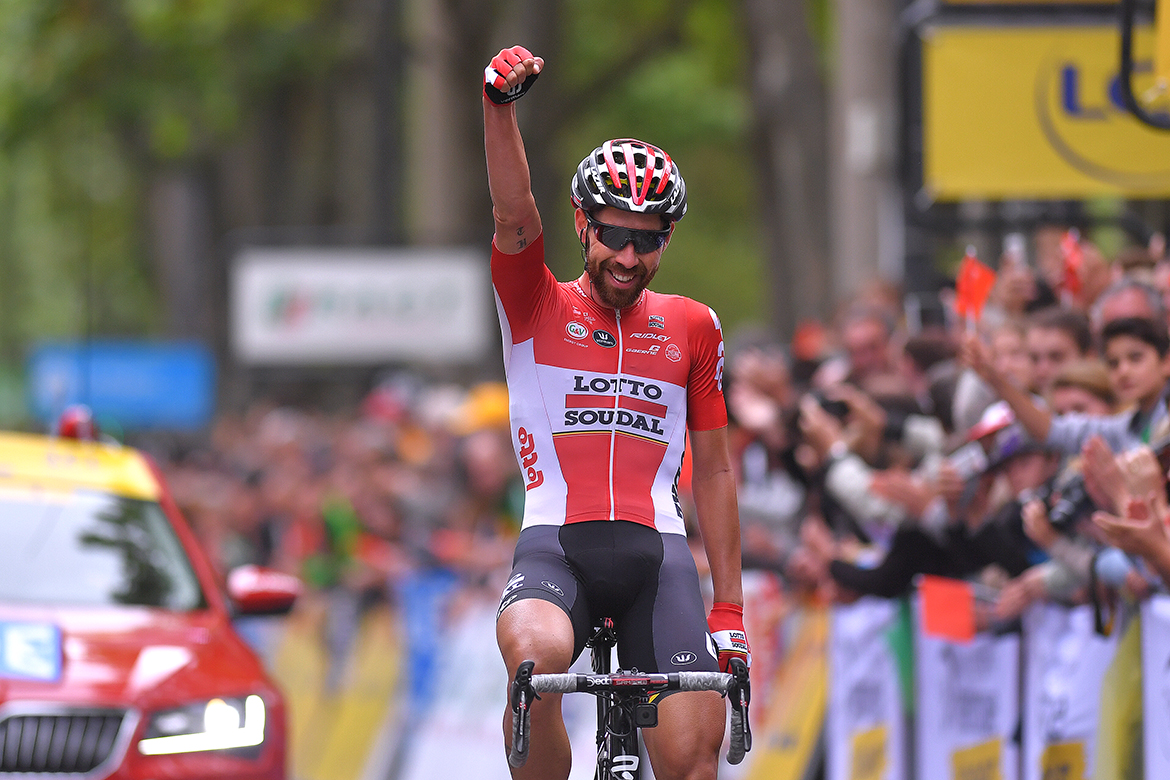De Gendt bares his soul in intimate autobiography
Belgian opens up about depression, thoughts of retirement and his box of magic tricks for making attacks

Thomas De Gendt is known as one of the strongest and most aggressive riders in the WorldTour and his cycling talents helping him win or dominate in minor Grand Tour classifications from breakaways.
However, in an intimate autobiography the Belgian rider has revealed a far more personal and intimate side, revealing he suffered with a moment of depression in 2017 and thought about retiring during the COVID-19 lockdown this spring.
The autobiography is called ‘Solo’, reflecting De Gendt’s love for attacking in races, was written with Jonas Heyerick, the editor of the Bahamontes magazine.
“People know me as someone who is pleasant and fun, but of course it is not always that way. I also wanted to tell the other side. That’s how the book became very personal. I honestly wonder how people will react to it,” De Gendt told Sporza after presenting the book to the Belgian media.
"I pulled out all my wife's folders with newspaper clippings, from my childhood to now and with every article I remembered a story. It was quite surprising how many stories and anecdotes came up again. It was nice to go through everything and to recall those memories.”
De Gendt recalls his biggest and best victories in the book but also reveals his difficult moments, especially the start of the 2017 season when "a dark spot in my head that kept getting bigger"
"It started slowly, until I saw everything black. Everything was negative, first of all my marriage," De Gendt admitted to Het Nieuwsblad.
Get The Leadout Newsletter
The latest race content, interviews, features, reviews and expert buying guides, direct to your inbox!
In his book, De Gendt describes how in the summer of 2016 he "started to feel like an intruder in his own home". He felt out of place with his wife Evelyn and their children Amber and Timo.
"As a rider you are away from home a lot. You can make video calls as much as you want, but there are still so many things that you miss. During that time I felt like an intruder in my own home, I think a lot of riders recognize that," De Gendt revealed.
"It was a struggle. I had to adapt to my family and them to me. Our lack of understanding kept increasing. In the end I was happy if I could leave: I ran away to the races."
De Gendt's mental problems emerged during a training camp in Calpe in 2017.
"I went down the stairs to get my bike out of the garage but I collapsed at the bottom of the stairs. I sat down and cried like a little child for half an hour. After that I trained for five hours, but I don't remember anything about that ride. I was riding as if in a blur," De Gendt said in his book.
"I really had the urge to escape," he revealed, his personal problems drove him to go on the attack more in races.
"When you have physical pain, you only think about the physical pain. And not the problems in your head," he said. "That year in the Tour that I was there so often in that position. I had super form, everyone thought and that was true but it also showed how badly I was mentally."
De Gendt won races, including a stage at the Vuelta a España but they were short moments of escape.
"You feel the euphoria for a moment but it's not profound happiness. I was good at keeping up a facade," he said.
"I could be normal and funny but it wasn't like that at all. People who are really depressed often don't see it. They are masters of hiding. I was too."
De Gendt did not seek professional help but gradually recovered. He realised that his marital troubles were a result of his poor mental health rather than the other way around.
"Something clicked and I began to work on it. To see the positive again and to fight for our marriage, which we had not done for a while," he revealed.
"The coronavirus period has been a positive experience for us and we went through it very well together. I talked for a long time with Evelyn whether we should put what happened in my book. But precisely because those problems are no longer there, we thought it was okay to reveal them. We are now happy again."
De Gendt was able to train outdoors in Belgium during the spring when races were suspended. However, he came so used to spending time at home with his family, he considered retiring.
"It was like my life will be when I stop racing," he admitted.
"I didn't miss the racing in itself but being on the road with my teammates and the objectives that go with it. I was also at the end of the contract and the talks with the team were difficult, so I was really thinking about stopping."

His box of magic tricks
De Gendt will be 34 in November and his doubts arose as Lotto Soudal delayed contract renewals after furloughing some staff. He eventually returned to racing at the Tour de Pologne and went on to ride both the Tour de France and Giro d'Italia. He chased stage victories in both races, going on the attack and entertaining fans with his social media posts.
His best result was third on the stage to Madonna di Campiglio at the Giro d'Italia. At one point he revealed he did not feel safe at the Giro d'Italia after a number of COVID-19 cases emerged. He later backtracked and apologised for his comments.
"I've since extended my contract and the desire to race has also returned," he said of his temptation to retire.
"I will therefore be racing with full enthusiasm for at least another two years, although I do feel that the deterioration is starting but I feel good about it."
De Gendt has won 15 races, almost always from a breakaway. He turned professional back in 2006 and then raced for Topsport Flanders and Vacansoleil - DCM before joining Lotto in 2015.
Speaking to Het Laatste Nieuws, De Gendt revealed he was given a cortisone injection in 2009 as treatment for an injury, the drug making him feel he "could kick my pedals off." However, when asked he was clean replied bluntly: "Yes. I always have been."
De Gendt first made his name as a breakaway expert in 2012 when he won the stage to the summit of the Stelvio at the Giro d'Italia. He has since won nine other times, adding two stages at the Tour de France and one at the Vuelta a España.
He is both revered and feared by other riders who join him on the attack. He has his own 'box of tricks' to give him a better chance of victory.
"Mentally you can push other riders in a direction by trying to play them," he told Sporza.
"In an attack it sometimes depends purely on how you feel or sometimes you have to stick to the mathematics on your power meter. It depends on how the legs are."
There are also the tricks of the breakaway.
"Now and then I have to act a bit. If I suffer, I hide it pretty well. And if I don't, I sometimes pretend I can't go on anymore," he writes in his book in an extract published by Sporza.
"Sometimes it's just the opposite: if I don't feel 100 per cent, I sometimes pretend to be better than I am. I go just a little faster on the front, even if I'm at my limit or even over my limit. That's how you instil fear in your rivals.
"Having the mental upper hand is often worth a lot."

Stephen is one of the most experienced member of the Cyclingnews team, having reported on professional cycling since 1994. He has been Head of News at Cyclingnews since 2022, before which he held the position of European editor since 2012 and previously worked for Reuters, Shift Active Media, and CyclingWeekly, among other publications.